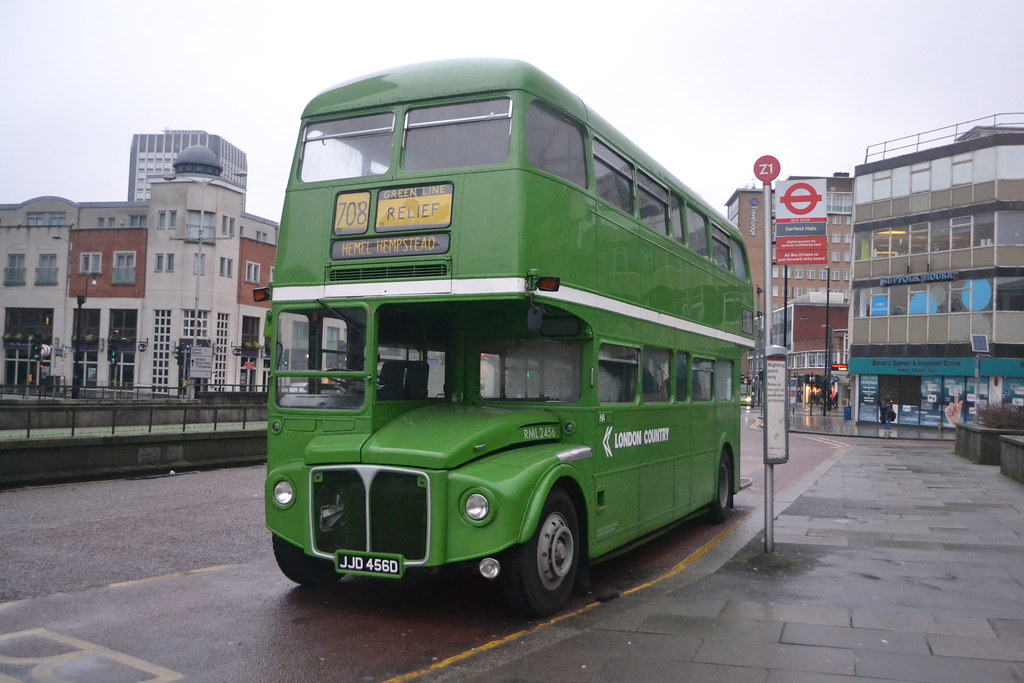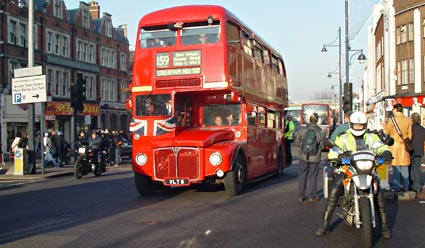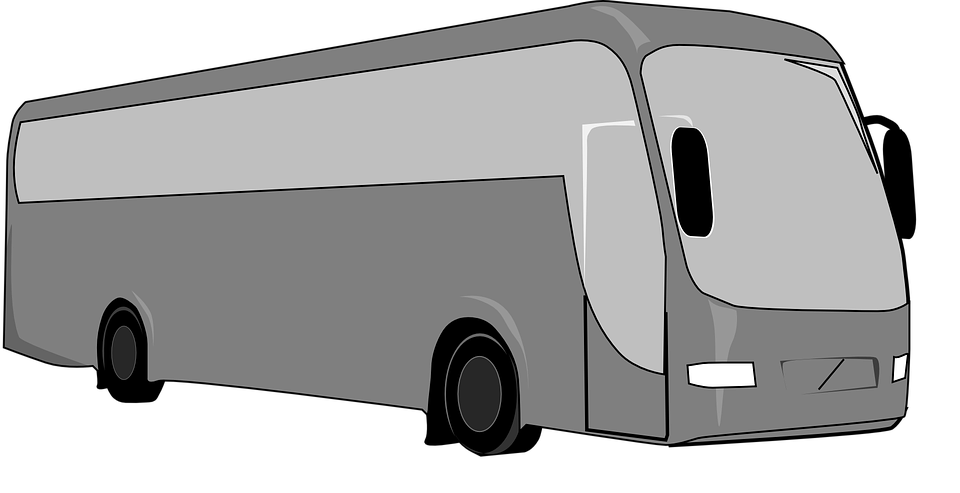For The Transit Fans: Vehicle Profile: AEC Routemaster
(Love it or Hate it Brexit is here, regardless the USA stands with our British friends)
The Hall of Transit Greats welcomes its first European entrant and a British cultural icon.

London Transport AEC Routemaster RML and RM units in Piccadilly Circus, London

Manufacturer Quick Facts:
Founded: 1912
Ceased Operations: 1979
Main Office: Southall, Greater London, England
Industry: Trucks, Transit Buses, Motorcoaches, Heavy Vehicle Components
Notable Product: Routemaster, Mammoth, Matador, Majestic, Renown
_heritage_route_9_Trafalgar_Square_23_April_2006.jpg)
First Group London AEC Routemaster RM
Model Quick Facts:
Vehicle Length: 27 ft 6 inches (RM) or 30ft (RML)
Vehicle Width: 8 ft
Vehicle Height: 14 ft 4 1/2 Inches
Engine Options: AEC AV590 9.6L or Leyland O.600 9.8L, Cummins ISC (American Imported)
Transmission Options: AEC 4-Speed Semi Automatic
Assembly: AEC Southall, Greater London, England (Components)
Park Royal Vehicles, Park Royal, West London, England (Body Construction)

London Transport AEC Routmaster RM, RML and RCL units at rest in Mortlake Garage, London
Overview: The Routemaster was designed between 1947 and 1956 in an effort to replace older AEC Regent RT models by improving upon its flaws. The newer design was meant to be easier to repair, lighter, more fuel efficient and have a higher passenger capacity. The RT was an aging platform developed in 1938 and was in need of an update. The Routemaster was also intended to make use of the repair and maintenance facilities at Aldenham Bus Works.
,_2010_North_Weald_bus_rally.jpg)
London Transport AEC Regent III RT
The Routemaster was also designed to be easier to drive, it weighed 3/4 of a ton less than the RT and carried 64 passengers while the older RT carried 56. Most of its weight loss is attributed to the extensive experimentation with lightweight aluminum metals during WWII aircraft production. This was the first bus in the world to feature an independent front suspension, power steering, an automatic gearbox and powerful hydraulic brakes. The Routemaster was also more comfortable because of its construction which consisted of a sub frame which housed the engine, transmission and chassis and was riveted onto the body frame. This allowed for the two halves of the bus to be separated and repaired independently of one another, it also meant that all buses were interchangeable with one another, almost a LEGO style approach which cut down the amount of time buses were out of service in the repair garage.

London Country AEC Routemaster RML
(London Country buses carry passengers to and from the suburbs and are noted by their green color)

The Final Hurrah, Transit Fans from all over came to say goodbye to a Legend on the last day of Routemaster service.
Unit Designations:
RM: (Routemaster) These were standard length Routemaster units at 27.5 ft long. The legal limit at the time and seated 64 Passengers.
RML: (Routemaster Long)These units are exactly the same as RM units aside from a small half window at the center of the bus and 8 extra seats seating 72 passengers. RML units were slightly longer when length limits were relaxed and measure at 29.91 ft.
RMC: (Routemaster Coach) These units were intended for use by London Country service, which transports passengers to and from London as well as provide service in the Home Counties. Because service is slightly longer distance than it is inner London. RMC units had modified suspension systems to make the ride even more comfortable, and alternate interior designs more like that of a motorcoach. RMC units also had modified transmissions to allow for higher gear ratios because these units did more highway driving than standard RM units. RMC's seated 57 and were
RCL: (Routemaster Coach Long) RCL units were longer versions of RMC units and featured the same motorcoach style interiors but had bigger engines and seated 65 people. Like the RMC units they also had electric powered doors instead of an open platform.
RMF: (Routemaster Front) RMF units shared the Electric door of the RMC/RCL units but had the door at the front of the bus. They were designed to be used outside of London and saw most of their use at Airports.
RMA: (Routemaster Front Airport) RMA units were identical to RMF units but were built for the Airports and Airliners and were slightly shorter to corner around airports easier.
FRM: (Front Routemaster) Only one FRM unit was built as an experimental design. It is a standard RM unit but with a rear engine design and different front fascia and front door operation. It is currently preserved by the London Transport Museum.

London Transport AEC Routmaster RM
Retirement: London retired the Routemaster in the 2000's due to higher running costs versus new buses. Older Routemaster buses required 2 man operation (Driver, Conductor). Toward the end they were converted to 1 man operation. Because the buses would need a second overhaul and refurbishment as well as rising criticism of the "open platform" rear design, and the lack of a wheelchair ramp the Routemaster was eventually retired. Many fans of the bus gathered to see the bus on its final scheduled run. Currently only one heritage line exists in London served by the original Routmaster. After the buses were retired many of them were sold to private companies or private owners where they have a new life as Tour Buses. Many have been exported to countries all around the world. Some have been converted to open top designs, some have even been converted to Motor Homes and Mobile Restaurants the Routemaster has had one of the best vehicle retirements in history with almost 1,300 buses of the original 2,876 still intact.
Replacing an older design and now succeeded by a new one, the middle child in a long line of iconic buses, the Routemaster is home in the Hall of Transit Greats.
Routemaster 60th Anniversary Gathering
The Final Days of Routemaster Service, Slowly being Phased Out
-
 2
2




0 Comments
Recommended Comments
There are no comments to display.
Create an account or sign in to comment
You need to be a member in order to leave a comment
Create an account
Sign up for a new account in our community. It's easy!
Join the herd!Sign in
Already have an account? Sign in here.
Sign In Now